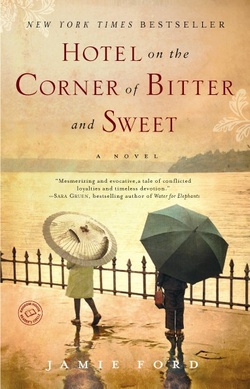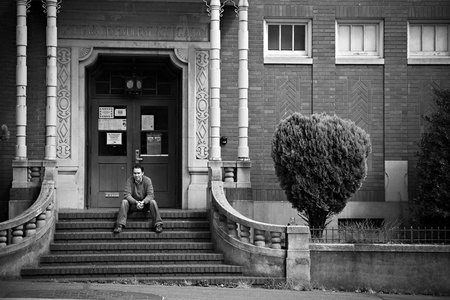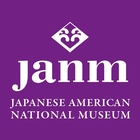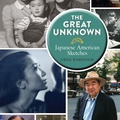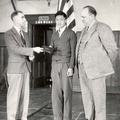“On the side of the trunk was the name Shimizu, hand-painted in large white letters. It was opened for the curious crowd. … The new hotel owner explained that in the basement she had discovered the belongings of thirty-seven Japanese families who she presumed had been persecuted and taken away. … Henry stared in silence as a small parade of wooden packing crates and leathery suitcases were hauled upstairs, the crowd marveling at the once-precious items held within … items that had collected dust, untouched, for forty-plus years. … The more Henry thought about the shabby old knickknacks, the forgotten treasures, the more he wondered if his own broken heart might be found in there, hidden among the unclaimed possessions of another time. Boarded up in the basement of a condemned hotel. Lost, but never forgotten.”
Such are the issues that Henry must resolve in Jamie Ford’s debut novel, Hotel on the Corner of Bitter and Sweet. At the crux of this powerful, multi-layered literary work is a heartwarming friendship between Henry and Keiko, a Chinese American boy and a Japanese American girl, respectively—both of whom are U.S. citizens living in Seattle. Tragically, their lives were forever altered because of something neither could control: their ethnicity. During World War II, the U.S. government forced Keiko and her family to abandon their home and most of their personal belongings. They were, in effect, incarcerated in a concentration camp in rural Idaho. It is under these appalling circumstances that Henry was forced to determine his relationship with himself, Keiko, his parents, and his country.
In fact, to mirror Henry’s emotional state, Jamie set Hotel in 1986, after the Wah Mee Massacre, which was a time when the neighborhood was in decline. In addition to enhancing the story’s background, the setting has a personal meaning as well. Although Jamie was too young to appreciate the significance of the Wah Mee Massacre, “it really upset [his] grandparents, who met and worked at the Wah Mee Club decades earlier. In the aftermath of the shootings, the neighborhood seemed to atrophy––to die on the vine as non-Asian people stopped going there for lunch, dinner, shopping, etc. Chinatown was cast as this place ripe with tongs [ed. note: similar to an underground organization] and violence, which was not the case. [H]onestly [Jamie] think[s] it took twenty years for the stain of those murders to go away.”
Hotel is a New York Times bestseller and has been translated into 24 languages. According to the author’s website, www.jamieford.com, Hotel has garnered numerous accolades including the American Booksellers Association’s #1 Book Club Pick, a Target Book Club Pick, an IndieBound NEXT List Selection, a Borders Original Voices Selection, a Barnes & Noble Book Club Selection, and a Pennie’s Pick at Costco among others.
When speculating on the acclaim and popularity of his novel despite delving into a dark period in U.S. history—incarceration of U.S. citizens of Japanese descent—Jamie observes that our society is maturing and he surmises that we are no longer above “turning over rocks and looking at the squishy things that lay underneath.” He may have a point there, but it may have as much to do with his adept storytelling as anything. Ultimately, Hotel might be foremost a love story that readers thoroughly enjoy while having their minds opened along the way. Indeed, it is one thing to simply educate by documenting historical events, but it is a whole different beast to take on the challenge of widening the audience of those willing to be taught (or reminded of) dark moments in the nation’s history while not sounding off-putting. Unmistakably, Jamie has skillfully guided his readers through a teachable moment in an entertaining way, and done so with flying colors.
Still, notwithstanding such literary praise as, “A timely debut that not only reminds readers of a shameful episode in American history, but cautions us to examine the present and take heed we don’t repeat those injustices” (Kirkus Reviews), Jamie did not intend the novel to have a political overtone in light of some of this past decade’s tragic global events that had some in the media revisiting discussions of the Japanese American incarceration during World War II. He is clear on this point: “I had no intention of creating a morality play.” With that said, however, he is aware, and is disturbed by, the ignorance of those who proclaim 5-star praises for certain books that most people, regardless of their political leanings, recognize as gimmicks, as instruments “to generate cash through controversy.”
In preparing for Hotel, Jamie researched extensively. He purchased a map of Seattle as it was in 1939 so he could picture the city before the I-5 (Interstate 5) bisected the neighborhood in his story. A few other tasks he undertook before visiting Seattle to get his feet wet, were diving “into the usual suspects—a lot of non-fiction books, some well known, others out-of-print” as well as joining Densho, an organization that preserves the oral history of the Japanese experience in the U.S. during World War II. Eventually, despite knowing the area fairly well, Jamie visited Seattle a few times to, among other things, comb the Wing Luke Asian Museum archives and meet with Doug Chin, a historian and activist. He also noted that it did not hurt that Walt Woodward, the editor of the Bainbridge Review, where Jamie first worked after college, was the only news journalist in the entire country writing editorials against the incarceration of Japanese Americans.
Through his diligent research in preparation for Hotel, perhaps Jamie’s biggest surprise that he discovered was how little he knew of his local Puyallup Fairgrounds growing up. As a youth, each summer, “doing the Puyallup” was a rite of passage: “[he] saw concerts there, rode carnival rides, ate scones.” But what he came to learn is that, during the forced removal of Japanese Americans in Seattle, the fairgrounds were a makeshift assembly center known as Camp Harmony. Apparently Jamie did not make that connection until he researched for Hotel, and he is sure that most people are still oblivious to that aspect of the fairgrounds’ history.
Jamie may not have intended to present Hotel as primarily a history lesson, but even he is haunted by the images in his novel where “people are burning their family photos—things that might connect them to Imperial Japan. The Nisei and Issei made tremendous sacrifices of culture and identity, from giving up their livelihoods, to serving in the 442nd. They were truly part of that Greatest Generation.” His readers of all ages and ethnicities, but especially Japanese American youth, may be well served to ponder the horrific desperation and helplessness our ancestors of U.S. citizenry suffered because the U.S. Constitution was undermined by a few high-powered individuals. It is incomprehensible for us Japanese Americans growing up in the twenty-first century but, unfortunately, perhaps relatable to other ethnicities.
While it is true that Jamie did not write Hotel with “any greater agenda than the story on the page,” he did want to “create characters that were interesting and perhaps unexpected representations of people at the time.” Jamie realized that even in such a turbulent time for Japanese Americans, things are not as black and white as we may want. Hence, all Caucasians were not bigots; there were many Caucasians who “volunteered in the camps, looked after their neighbors’ property, and were all around swell people that recognized the injustice of what was going on.” Similarly, with Mr. Okabe, Jamie wanted to “portray him as an educated, white-collar worker, because many of those taken away were just that.” He also cites to Mrs. Beatty (“a total alpha-female”) whom he created as a contrast to the deferential, June Cleaver-type woman.
Just as his characters fight against generalizations and misconceptions, so too exist misconceptions about what Japanese Nationals and Japanese Americans suffered during World War II. To this end, Jamie, has a great point: “I think to have a misconception you have to have a general awareness to begin with.” Growing up on the west coast, Jamie was accustomed to associating with people who were aware to some extent of the tragedies that occurred to the Japanese American population back then. But as he has traveled to book events in other parts of the country, he has noticed that awareness fades. Unbelievably, Jamie has had someone actually say to him, “I taught high school history for 30 years and never taught this.” Furthermore, he also experienced a Tokyo reporter admitting that he had never heard of the Japanese incarceration in the U.S.
But to risk putting words in Jamie’s mouth, as regarding the Japanese community, his novel’s greatest impact and most worthwhile personal reward may be how his novel has not only brought together generations of Japanese Americans, but also how it has united family units by providing an instrument by which younger generations can inquire of past events and by which older generations can share memories they have kept locked deep inside without there ever being that waiting-for-the-right-time moment.
Jamie observed that the incarceration has affected each generation differently. “For the older generation it was a tremendous loss of house and hearth, of livelihood, of culture and respect. But for the younger generations, it was often the first time they went to school and were not the minority for a change. And subsequently, those different generations developed different comfort levels about talking of camp and the things that happened there.” But since publishing Hotel, Jamie has gratefully received numerous comments from Sansei “who appreciate being able to talk about the book with their parents who for decades wouldn’t talk about” what happened to them during World War II.
I would be remiss if I did not mention that on par with helping Japanese families open lines of communication that previously were virtually nonexistent, Jamie may have been just as honored and privileged by being invited to a Minidoka Reunion, which he attended.
Certainly, by anyone’s measure, Jamie Ford has come a long way since his youthful scone-eating days at the local fair.
* * *
Please join us on January 29, 2011, at 2:00 p.m., as the Japanese American National Museum hosts author Jamie Ford for a book discussion and reading from his New York Times bestseller, Hotel on the Corner of Bitter and Sweet. Additionally, if you are unable to make the book event, the bestseller is available for sale in the Museum Store.
© 2011 Edward Yoshida


